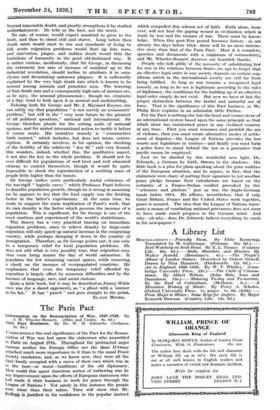The Paris Pact
Information on the Renunciation of War, 1927-1928. By J. W. Wheeler-Bennett. (Allen and Unwin. 8s. 6d.)
UNDOUBTEDLY the real significance of the Pact for the Renun- ciation of War was lost upon the statesmen who assembled
in Paris on August 27th. Throughout the protracted nego. tiations neither. the Foreign Office nor the Quai D'Orsay
attached much more importance to it than to the usual Peace Society resolution, and, as we know now, they were all the time busily occupied with a move of their own which was in in the best—or worst—traditions of the old diplomacy, How could this queer American notion of outlawing war be any improvement upon the efforts of European statesmen who had made it their business to work for peace through the
League of Nations ? - Yet surely in this instance the people were wiser than their. rulers. Time will show that Mr.
Kellogg_ is justified in his confidence in the popular instinct which compelled this solemn_ act of faith. Faith alone, how ever, will not • heal the gaping wound in civilization which is Made by war and the menace of war. There must be know- ledge. When this post-War period becomes history—as are already the days before 1914—there will be no more instruc- tive story than that of the Paris Pact. Here it is complete; speeches and documents with a millunum of commentary; and Mr. Wheeler-Bennett deserves our heartfelt thanks.
People who talk glibly of the necessity of substituting law for war in the relations between States are apt to forget that an effective legal order in any society depends on 'certain cols ditions which in the international society are still far front being fulfilled. As long as war remains a recognized legal remedy, as long as its use is legitimate according to the rules of diplomacy, the conditions for the building up of an effective legal order simply do not exist. But now we •have at last the proper distinction between the lawful and unlawful use of force. That is the significance of this Pact business, as Mr. Philip Kerr explains in an admirable little Preface.
For the Pact is nothing else but the head and corner-stone of an international system based upon the same principle as that which alone has maintained peace in any civilized country at any time. First ypu must renounce and prohibit the use of violence, then you must create alternative modes of settle- ment of disputes—the League of Nations provides the law courts and legislature in embryo—and finally you must halie a police force to stand behind the law as a guarantee that pacific "means be employed.
Lest we be dazzled by this wonderful new light, Dr. Edwards, a German by birth, throws in the shadows., His little book is a plea for plain speaking about the grim realities of the European situation, and he argues, in fact, that the statesmen were chary of putting their signature to yet another peace pledge because their calculations are based on the certainty of a Franco-Italian conflict provoked by the " schemers and plotters " just as was the Anglo-German tussle before 1914. He affirms, nevertheless, that if only Great Britain, France and the United States work together, peace is assured. The idea that the League of Nations repre- sents a means of ventilating national grievances does not seem to have made much progress in the German mind. And why—oh why—does Dr. Edwards believe everything he reads in the newspapers ?


















































 Previous page
Previous page